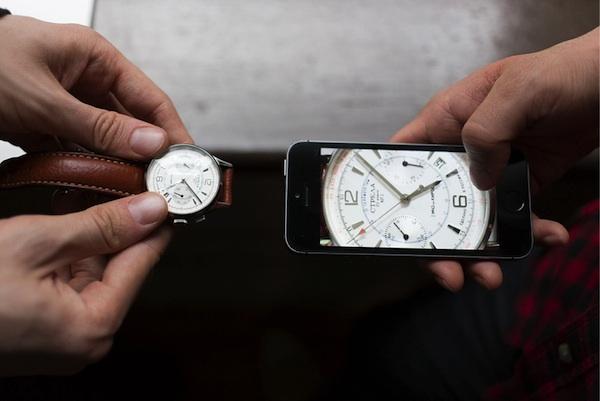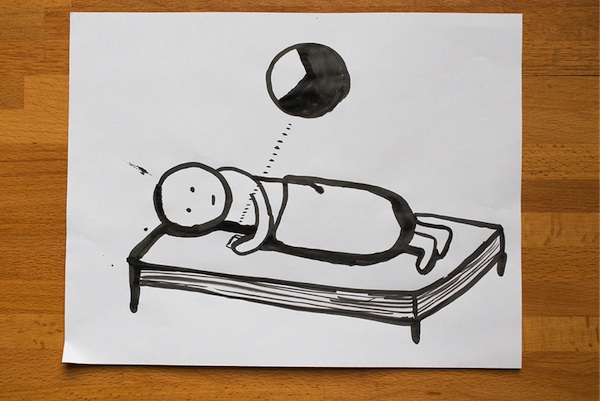There’s Big Time, small time, Einstein’s space time, game time, mealtime, playtime. In a real sense, time is knitted into the very fabric of our social lives as the relentless four-dimensional universe suggests. But in truth, we play with time and fantasize our imagined advantage. As an agency, time is extravagant, flamboyant, boring, nullifying, brutal, exquisite, the elephant in the room of our every human encounter. Globalization has accelerated the dynamics of collapsed time zones, and our sense of the present diminishes right before our eyes. For now, apparently, we live in the drama of no time and all time.
LACMA’s Art + Technology Lab has happened upon two intrepid artists, Taeyoon Choi and E Roon Kang, who are prepared to enter that H. G. Wellsian realm where “time” is under investigation. I talked to them to get their take on the aims of the project, in the broadest sense possible. And as one would expect, time travelers treat time as an object, as if the mere focus alters the present. Taeyoon and E Roon will take time (ours) apart and then re-assemble it, giving us a new vision or perception of this weird, ectoplasmic atmosphere from which we splice and dice our lives. Technology, aesthetics, and a raw hands-on data spectrum take an interior view of global synchronization and the notion of simultaneity, the master time.
But who are these guys? And how did this project come about, and why? The fortuitous comingling of their personalities and their ideas, which is the birth of this unique and fascinating open-ended “time” project, known as In Search of Personalized Time, is a wonder unto itself.
Born in 1980, E Roon grew up in Seoul, Korea. He implied that his generation from Korea has observed a great deal of collective effort toward making things better and faster—toward the notion of perfection. Improvement in anything and “speed” became a “stuck” mindset. “What am I doing?” was his big question, which led him to pursue his MFA at Yale University. While working on a project at Yale he had one of those “a-ha moments”: a colleague and friend observed that E Roon had spent more time thinking about how to expedite the process than he had on the goal of the project. A light went on! The intellectual conundrum of time, on which our modern life conceptually hangs, may very well be self-deluding. His MFA thesis was adequately titled Manual: The Manual: Rethinking Inefficient Disciplines of Efficiency; he went on to a research fellowship at SENSEable City Laboratory at MIT, where they study real-time flux of cities and their infrastructures. When asked whom or what was the most inspirational icon informing his thinking, he said, “I can't think of someone or something specific. . . . I complain about things a lot. I'm complaining about time with this project.” His intensity suggested something more fundamental. He created and runs his own design studio, Math Practice, in New York City.
Taeyoon, born in 1982, achieved his BFA at the School of the Art Institute of Chicago and received a Masters in Culture and Technology at the Korea Advanced Institute of Science and Technology. On first impression, Taeyoon seemed the more graphic-minded designer as he finely doodled on a beautiful box while E Roon spoke. And though on some level this may be somewhat true, there was evidence of an equally profound intellectual curiosity about culture and time, which coalesced through his nomadic lifestyle. He was struck by the odd nature of detachment and bonding that jet lag could produce in combination with a long-distance collaboration and relationship. He went on to question the relationship of time and place itself. What if we were always jet lagged? Maybe it’s a state of “off-time”? A creative gap? When asked about an artist or a person who might have been inspirational in his thinking, he sighted Haegue Yang, one of the artists featured in Your Bright Future, LACMA’s 2009 exhibition of contemporary Korean artists, who is particularly concerned with the in-between spaces where cultures collide. Equally interesting, Taeyoon is the co-founder and operator of the School for Poetic Computation. Perhaps in this vein, time is seen not as mere reduction of a clock, but more a poetic, elastic unit of memory—action as an individual creation of “elsewhere.”
This crisscross of experience and individualism has made for a marvelous symbiosis of intuitive wisdom concerning time. Taeyoon and E Roon found that their separate interests and approaches co-join around a sophisticated question of time. They recently hosted the Real Time Film Club, where they screened the movie Time Code to conduct an “exercise in simultaneity.” Also, they are interested in Bernard Stiegler, the French philosopher known for his book series Technics and Time. They claim they needed a muse. These writings set forth a complex argument in which the human and technical should not be seen as two separate entities, but as an evolutional union evolving not in time “but rather constitutes time as such.” In all this, “speed” is the operative ingredient. (Who would have guessed?) Now that’s cool!





